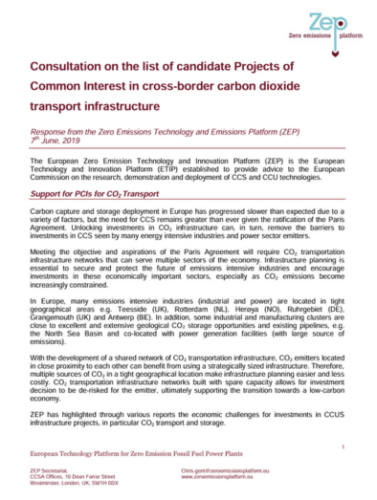Consultation on the list of candidate PCIs in cross-border CO2 transport infrastructure
The European Zero Emission Technology and Innovation Platform (ZEP) is the European
The Technology and Innovation Platform (ETIP) was established to provide advice to the European
Commission on the research, demonstration, and deployment of CCS and CCU technologies.
Support for PCIs for CO2 Transport
Carbon capture and storage deployment in Europe has progressed more slowly than expected due to a
variety of factors, but the need for CCS remains greater than ever, given the ratification of the Paris Agreement. Unlocking investments in CO2 infrastructure can, in turn, remove the barriers to investments in CCS seen by many energy-intensive industries and power sector emitters.
Meeting the objective and aspirations of the Paris Agreement will require CO2 transportation infrastructure networks that can serve multiple sectors of the economy. Infrastructure planning is
essential to secure and protect the future of emissions-intensive industries and encourage investments in these economically important sectors, especially as CO2 emissions become increasingly constrained.
In Europe, many emissions-intensive industries (industrial and power) are located in tight
geographical areas e.g., Teesside (UK), Rotterdam (NL), Herøya (NO), Ruhrgebiet (DE), Grangemouth (UK), and Antwerp (BE). In addition, some industrial and manufacturing clusters are close to excellent and extensive geological CO2 storage opportunities and existing pipelines, e.g., the North Sea Basin and co-located with power generation facilities (with a large source of emissions).
With the development of a shared network of CO2 transportation infrastructure, CO2 emitters located
near each other can benefit from using a strategically sized infrastructure. Therefore, multiple sources of CO2 in a tight geographical location make infrastructure planning easier and less costly. CO2 transportation infrastructure networks built with spare capacity allow for investment decisions to be de-risked for the emitter, ultimately supporting the transition towards a low-carbon economy.
ZEP has highlighted through various reports the economic challenges for investments in CCUS
infrastructure projects, in particular CO2 transport and storage.
In its 2014 report on a Business Case for Commercial CO2 Transport and Storage ZEP identified the need for innovative business models, which align commercial interests across the entire CCS chain; and given the long lead times – 6 to 10 years for both pipelines and storage sites – demonstrated the need for developments to start now, ahead of wide-scale deployment. The report was followed by An Executable Plan for CCS in Europe, which built on the earlier concept of CO2 “Market Makers” to support the deployment of CCS by de-risking infrastructure investments.
In your opinion, is the proposed project significantly contributing to market integration/sustainability/security of supply/competition, and therefore needed from an EU energy policy perspective?
ZEP believes that all five proposals contribute to the criteria set out for CO2 transport projects under
the TEN-E regulations. Developing shared infrastructure for CO2 transport and storage will increase
security by allowing interconnection between stores and emitters. Resources can be used most efficiently by developing economies of scale through shared transport and storage infrastructure.
CCS is vital to enabling the reduction of CO2 emissions in key sectors of the EU economy, contributing
to the long-term sustainability of Energy Intensive Industries, and can further provide a cost an effective method of decarbonisation in heat, transport and power. Given that some areas of Europe are strategically better placed to develop CCS than others, cross-border transportation of CO2 will be vital to ensure efficient use of resources so that benefit can be shared between regions.
All five project proposals submitted will significantly contribute to the sustainability of European
industries in a low-carbon future. Furthermore, the development of CO2 transport infrastructure can
contribute significantly to the security of supply in Europe, allowing the continued use of a wider range
of energy sources.
Developing strategic CO2 transport infrastructure will enable a CO2 market to develop between
Member States, enabling industries located in multiple Member States to benefit from CCS, and
contributing to wider market integration and competition.
